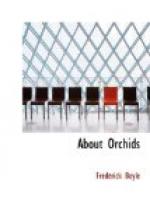Very few of those who grow Odontoglossums know much about the “Trade,” or care, seemingly. It is a curious subject, however. The genus is American exclusively. It ranges over the continent from the northern frontier of Mexico to the southern frontier of Peru, excepting, to speak roughly, the empire of Brazil. This limitation is odd. It cannot be due to temperature simply, for, upon the one hand, we receive Sophronitis, a very cool genus, from Brazil, and several of the coolest Cattleyas; upon the other, Odontoglossum Roezlii, a very hot species, and O. vexillarium, most decidedly warm, flourish up to the boundary. Why these should not step across, even if their mountain sisters refuse companionship with the Sophronitis, is a puzzle. Elsewhere, however, they abound. Collectors distinctly foresee the time when all the districts they have “worked” up to this will be exhausted. But South America contains a prodigious number of square miles, and a day’s march from the track carries one into terra incognita. Still, the end will come. The English demand has stripped whole provinces, and now all the civilized world is entering into competition. We are sadly assured that Odontoglossums carried off will not be replaced for centuries. Most other genera of orchid propagate so freely that wholesale depredations are made good in very few years. For reasons beyond our comprehension as yet, the Odontoglossum stands in different case. No one in England has raised a plant from seed—that we may venture to say definitely. Mr. Cookson and Mr. Veitch, perhaps others also, have obtained living germs, but they died incontinently. Frenchmen, aided by the climate, have been rather more successful. MM. Bleu and Moreau have both flowered seedling Odontoglots. M. Jacob, who takes charge of M. Edmund de Rothschild’s orchids at Armainvilliers, has a considerable number of young plants. The reluctance of Odontoglots to propagate is regarded as strange; it supplies a constant theme for discussion among orchidologists. But I think that if we look more closely it appears consistent with other facts known. For among importations of every genus but this—and Cypripedium—a plant bearing its seed-capsules is frequently discovered; but I cannot hear of such an incident in the case of Odontoglossums. They have been arriving in scores of thousands, year by year, for half a century almost, and scarcely anyone recollects observing a seed-capsule. This shows how rarely they fertilize in their native home. When that event happens, the Odontoglossum is yet more prolific than most, and the germs, of course, are not so delicate under their natural conditions. But the moral to be drawn is that a country once stripped will not be reclothed.




